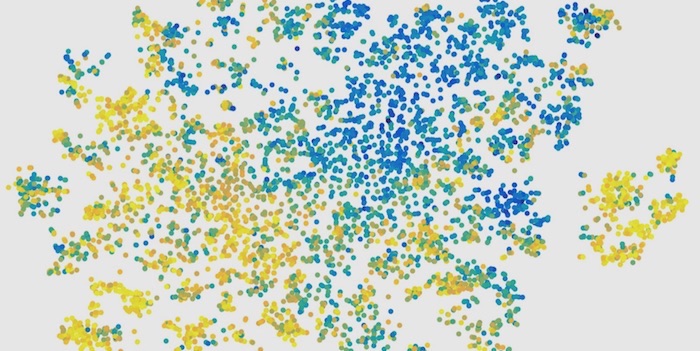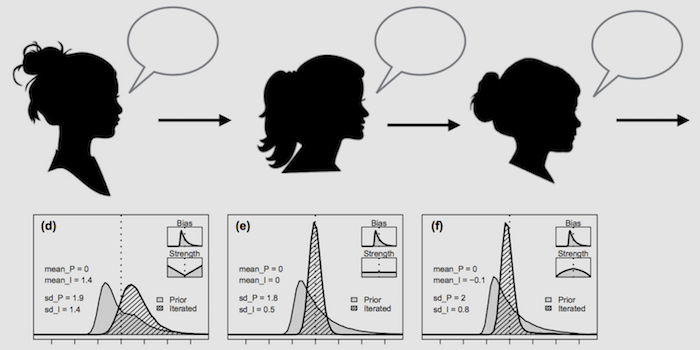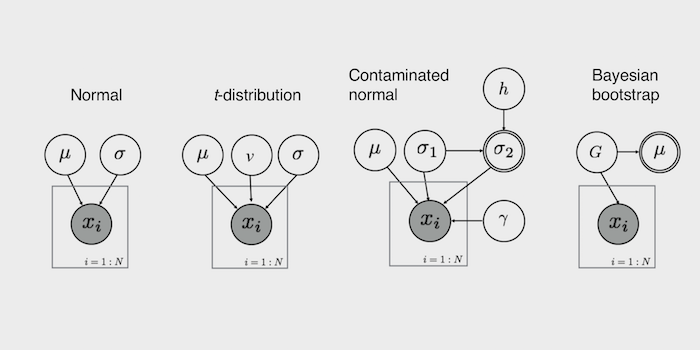Sampling frames and reasoning from censored data
When people have to reason inductively about novel properties, we are often presented with evidence that is biased or censored in some way. Some voices are systematically missing, some phenomena are unobservable, and so on. In this paper we consider how people reason in such situations, and show that in some situations at least, people can be very sensitive to the nature of the censoring.
Paper PsyArXiv OSF repository ExperimentsCurse of dimensionality
When learning to categorise new entities in the real world, people face the "curse of dimensionality" problem. There are many, many features that each entity possesses, which makes it hard to work out how to classify them. In this paper we consider a simplified version of the problem, to see how human learning is affected as the number of features increases.
Paper PsyArXiv OSF repository ExperimentsVanishing bandits
In real world decision making, the options we have available to us can disappear if we do not pursue them. In this project we examine human performance on restless bandit tasks with and without the threat of option loss.
Paper PsyArXiv OSF repository ExperimentsSmall world of words
How is lexical knowledge organised in the mind? One way to examine this is to look at which words immediately spring to mind when another word is mentioned. This project collected the largest data set on word associations in English, examining associations between 12,292 cue words, collected from about 90,000 people between 2011 and 2018
Paper Github HomepageWhen extremists win
How does the process of information transmission affect the cultural or linguistic products that emerge out of that process? This project illustrates how "iterated learning" systems are disproportionately influenced by learners with the strongest biases.
Paper PsyArXiv OSF repository GithubWhat do the experts know?
Forensic handwriting examiners currently testify to the origin of questioned handwriting for legal purposes. This study is the first to examine whether handwriting experts are able to estimate the frequency of US handwriting features more accurately than novices. We consider several methods for aggregating predictions from multiple experts: substantial improvements in expert predictions are possible when a hierarchical Bayesian method is used.
Paper OSF repository MediaNone of the above
In everyday life we constantly encounter new people, events, objects etc that don't fit neatly into any of our old categories. When this happens we need to "reject" our existing categories and "discover" a new one. In this project we investigated the inductive biases that people bring to this "novelty detection" problem.
Paper Github ExperimentsBayesian cognition revisited
Are people really "rational" Bayesian reasoners? This is a recurring question in cognitive science, one that we revisit in this paper. We argue that there are two qualitatively different ways in which a Bayesian model could be constructed. One approach is to use Bayes rule as a normative standard upon which to license a claim about optimality. An alternative approach is to treat Bayesian inference as a descriptive tool, in which the Bayesian model need not correspond to any claim that the underlying cognition is optimal or rational. We argue for the latter approach.
PaperRobust credible intervals
As Bayesian methods become more popular in behavioural science, they will inevitably be applied in situations that violate the assumptions underpinning the models typical used to guide statistical inference. With this in mind, it is important to know something about how robust Bayesian methods are to the violation of those assumptions. In this paper we focus on the problem of contaminated data...
Paper GithubObserve or bet
When should people forego immediate rewards and seek out information that might help us make better choices in the future? What strategies should people follow, and how do we learn them? Do people behave differently when the world is changeable? This project explored how people solve this "explore-exploit dilemma" in different environments.
Paper Github ExperimentsRunning online experiments
In 2015 the Adelaide CompCogSci lab organised a workshop on running online experiments at the EPC conference, covering the mechanics, practicalities and ethical issues associated with this kind of study.
Homepage




